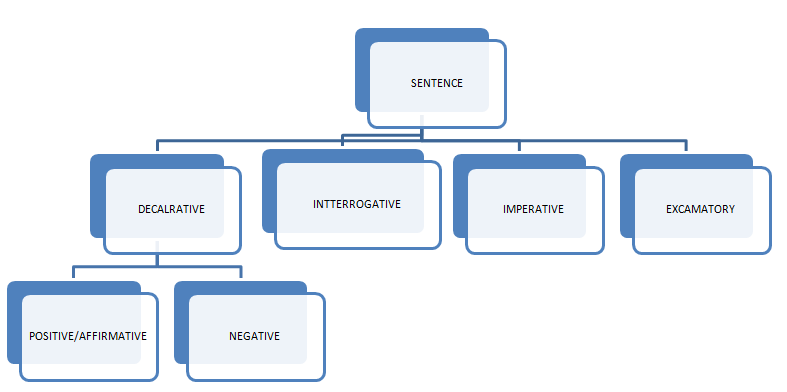In this tutorial you will learn about the Sentences and Types of sentences. and its application with practical example.
In this tutorial, we will learn about Sentences and Types of Sentences.
Prerequisites
Before starting with this tutorial we assume that you are best aware of the following topics:
- Nouns.
- Pronouns.
- Verbs.
- Adjectives.
- Adverbs.
- Prepositions.
- Conjunctions.
- Interjections.
In the previous lesson, we have learned about words and types of words(Parts of speech). Now, in this lesson, we will learn about the arrangement of words, according to our needs, which we call a sentence.
Sentence:
A sentence is a meaningful order of words we use to communicate our message to the listeners.
Examples:
1.I am learning English grammar.
2.He does not listen to his parents.
3.Please try to understand.
4.Will you marry me?
These all examples contain number of words in a proper order to communicate a meaning in a different manner.
Let us take some more examples:
5.A monkey on the tree
6.A big yellow house
7.In the car
In the above examples 5, 6, and 7
Do you see a proper sequence of words? Your answer must be a Yes.
Do you get a complete meaning of this arrangement? Your answer must be a No.
So, will we call them a sentence? No. Why?
Because, we do not get any proper meaning from any of the examples.
Such arrangements are not called a sentence, even if they have a proper arrangement, they are called Phrases (a part of the sentence).
Types of sentences
On the basis of nature, we can classify a sentence in to the following categories:
- Simple sentence
- Compound sentence
- Complex sentence
Let us understand them……!
- Simple sentence: a simple sentence contains a subject and a verb in it, makes a complete sense and does not depend on another sentences.
Examples:
- I will punish you for this.
- Honesty is the best policy.
- Hard work pays you back.
- Compound sentence: A compound sentence is made up of two simple sentences using any conjunctions.
Examples:
- I) He likes football. (simple sentence)
- II) He likes cricket. (simple sentence)
- He likes cricket and football. (compound sentence)
- I) She is my best friend. (simple sentence)
- II) I respect her a lot. (simple sentence)
- She is my best friend and I respect her a lot. (compound sentence)
- Complex sentence: A complex sentence has a simple sentence (independent) and a subordinate clause (dependent sentence).
Examples:
-
- Some people eat less so that they could maintain their health.
(Independent) (Dependent)
2. When I was a young boy, I had lost my favorite toy.
(Dependent) (Independent)
On the basis of meaning, sentences have been classified in four categories:
- Declarative sentence or A statement
- Interrogative
- Imperative
- Exclamatory sentence
Now let us understand them in detail.
- Declarative Sentence: A sentence which declares something to happen or not is called a Statement or Declarative Sentence.
A Declarative sentence may be an ‘assertion’ or ‘negation’. So, in this way, declarative sentence can be of two types:
- Positive or Affirmative or a statement of assertion: this type of sentences gives us a positive meaning.
- I love my country. (Positive meaning)
- Negative sentence: a sentence which gives is a negative meaning.
- I do not love my country. (Negative meaning)
- Interrogative sentence: A sentence which is used to ask a question is called an Interrogative sentence.
- Are you going somewhere?
- Don’t you understand English?
- Why are you crying?
- Who doesn’t play cricket?
So, if we try to answer question 1 and 2, our answers may me either in yes or no. But question 3 and 4 cannot be answered in yes or no, we have to answer them in a description.
Therefore, on this basis, we can say that Interrogative sentences are of two types:
- Yes/no type questions or closed type questions:
This type of question has only two options to answer, yes/no.
Example 1 and 2
- Descriptive questions or W-H questions or open questions:
This type of questions cannot be answered in yes or no. Since such questions have many ways to answer; therefore, we call them open questions or descriptive questions.
Example 3 and 4.
- Imperative sentence: A sentence which is used to ask a request or an order or a command or a suggestion is called an imperative sentence.
Examples:
- Please help me. (request)
- Shut your mouth up. (order)
- Don’t talk on phone while driving a car. (suggestion)
- Turn left. (command)
- Exclamatory sentence: A sentence which is used to show our expressions of joy, sorrow, fear etc is called an exclamatory sentence.
This type of sentences takes an exclamation mark in the last of the sentence.
Example:
- Wow! What a car!
- How dirty boy you are!
- Bravo! You have made it.

Simple, compound and complex sentences will be studied in details in lesson number 14.
Review:


